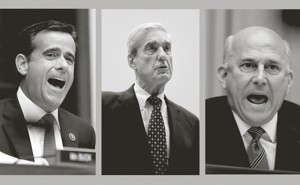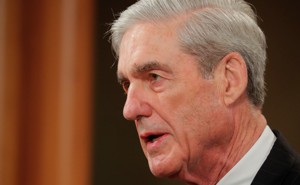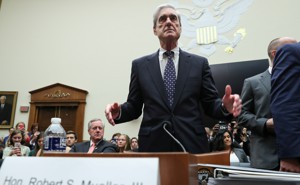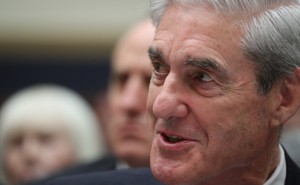“Robert Mueller and the Tyranny of ‘Optics’”, The Atlantic
Todd S. Purdum, Jul 25, 2019
The commentariat’s focus on performance over substance is the kryptonite of the modern media age.
How did he look? (Old, halting, at times confused). What did he say? (Not enough). How did he say it? (Monosyllabically, whenever possible). The first stretch of Robert Mueller’s grueling marathon testimony had barely ended when the national commentariat concluded that he’d had just about his worst day since an AK-47 round pierced his thigh in Vietnam 50 years ago.
“DAZED AND CONFUSED” was the Drudge Report’s blaring headline. But the Twitter verdict of NBC’s sober-sided Chuck Todd was almost as severe: “On substance, Democrats got what they wanted,” Todd wrote. “But on optics, this was a disaster.”
Optics—the kryptonite of the modern media age, the glimmering, crystalline material that can subsume substance at every treacherous turn. Or as the former Barack Obama speechwriter Jon Lovett rejoined to Todd on Twitter: “When you say ‘on optics, this was a disaster’ it is you saying so that helps make it true. The disaster of the optics is the elevation of optics and the claim by pundits that it was a disaster.”
In an age in which performance art is what passes for politics, pundits and politicos assumed the role of drama critic as they rushed to review the Mueller show—and in the week’s most overworked metaphor, routinely referred to his testimony as the “movie” version of his 448-page book. But whose optics, exactly, were these critics reflecting? Whose eyes were they looking through?
Breitbart News? Its homepage screamed, “Democrats Trumped Again. Dodges Questions—If He Understands Them.” Laurence Tribe of Harvard Law School? “Far from breathing life into his damning report, the tired Robert Mueller sucked the life out of it.” The provocateur Glenn Beck? His website said that the testimony sounded “like an argument at an old folks home during pudding hour.” Marc Thiessen of The Washington Post? He said on Fox News, “I don’t think any of us knew Bob Mueller was so fragile.” The New York Times? Its correspondent Michael M. Grynbaum described Mueller’s “halting, donnish presence” under a print headline that declared simply, “News Media Turned Theater Critics Are Not Impressed With the Star Witness.” Donald Trump himself? “This was one of the worst performances in the history of our country.”
MORE STORIES
Because Mueller himself was determined to make no news and break no ground—and by and large, he didn’t—it’s perhaps inevitable that accounts of his testimony should focus on the visual and aural impression he left, and not the still-stunning clinical conclusions of his report. And in the beginning, especially, he did look halting, his voice tremulous, his eyes searching as he strained to locate his congressional interlocutors on the dais or asked them to repeat their questions—by one count, more than 30 times. For most of the hearing, the former special counsel’s favorite answers were “yes,” “no,” “true,” “generally,” “I can’t get into that,” and “I’m not going to comment.” CNN’s Evan Perez calculated that he declined to answer a question at all 206 times.
Read: Robert Mueller keeps his promise
But Mueller’s testimony nevertheless gathered a certain quiet force as the day wore on, first before the House Judiciary Committee and then the Intelligence Committee, whose chairman, Representative Adam Schiff of California, had the last word and sought to have Mueller help “broaden the aperture” at the hearings’ end.
“From your testimony today, I’d gather that knowingly accepting assistance from a foreign government is unethical,” Schiff had barely said before Mueller quickly interrupted him. “And a crime … given certain circumstances,” Mueller said.
“To the degree that it undermines our democracy and our institutions, we can also agree that it’s unpatriotic and wrong?” Schiff continued. “True,” Mueller agreed. “The behavior of a candidate shouldn’t be merely whether something is criminal,” Schiff persisted. “It should be held to a higher standard, you would agree?”
“I’m not going to answer that, because it goes to the standards applied by other institutions besides ours,” Mueller said, before finally acknowledging that “certainly,” as Schiff put it, “we should hold our elected officials to a higher standard than mere evidence of criminality.”
If Mueller’s testimony frustrated Democrats—and delighted the Trump White House—it’s because he repeatedly refused to be drawn into either partisan talking points or legal and constitutional hypotheticals. His staff had warned the committees that he would not so much as read aloud from his own report if asked, and at one moment, he pointedly declined even to utter the word impeachment as a remedy for presidential misconduct. Again and again, Mueller passed up the chance to utter anything that might approach a riveting sound bite, much less a bold headline.
None of this is to say that Mueller’s testimony lacked moral authority or intellectual force. On the contrary, if his answers had only been read on paper—and not seen and heard on live television in an age of instant gratification and minuscule attention spans—the most important replies were crisp and clear enough: Yes, a president can be charged with obstruction after leaving office. No, his investigation was not a witch hunt. No, Russian interference wasn’t a hoax. Over and over, Mueller affirmed findings that many Americans would find deeply troubling.
Read: Three ways Mueller says Trump is lying
“It was hard not to be shocked again by the damning and sordid findings from his dense, two-volume report,” the Los Angeles Times editorialized this morning. “Anyone tuning in should have been appalled anew by the dramatic lengths the president went to stop the probe into possible obstruction of justice, as well as the efforts that his campaign staff took to capitalize on Russian meddling.”
Yet all along, the substantive punch of Mueller’s report has been muted by public and media focus on performance and optics—on how Mueller’s work is perceived, not on what it actually says: first, when Attorney General William Barr preempted the report’s official release with his own skewed and selective summary of its findings; again when Mueller felt moved to read his own statement to the public summarizing it; and finally during his testimony this week.
A CNN poll in April found that only 3 percent of respondents had read all of Mueller’s report, despite it being a best seller. If the Democrats’ goal in subpoenaing Mueller was to create a viral-video version of his report that would change the partisan stalemate over his findings and spark a groundswell of public support for impeachment, they’ve so far failed. If their goal was to get him to repeat, in Joe Friday fashion, his essential conclusions—that the Russians sought to meddle, the Trump campaign welcomed their help, and the president then tried to cover it up—they probably succeeded, especially in adroit questioning by Schiff and the Judiciary Committee chairman, Jerrold Nadler of New York.
But the larger problem with Mueller’s case was neatly summed up in his exchange with Republican Representative Guy Reschenthaler of Pennsylvania. “You made a decision not to prosecute?” Reschenthaler asked.
“No,” Mueller replied, “we made a decision not to decide whether to prosecute or not.”
That one fundamental decision—the decision not to decide, because he believed doing so would be inherently unfair, given Justice Department guidelines barring indictment of a sitting president and Trump’s corresponding inability to have his day in court—ensured that Mueller’s testimony, like his investigation itself, wouldn’t resolve anything. And that’s far more than a matter of mere optics. It’s a built-in flaw in the basic script, one that Charlton Heston as Moses himself couldn’t counter—and one that Mueller would strenuously argue was neither his preference nor of his own making, but one that he, and the rest of us, must to learn to live with. To act on, or not.
The Navy commendation that Mueller won for his combat action in April 1969 in Vietnam noted that “although seriously wounded during the firefight, he resolutely maintained his position.” The same could be said, for better and worse, of his career-capping appearance—all right, performance—on Capitol Hill: It was much more than a mere show.
TODD S. PURDUM is a staff writer at The Atlantic and the author of Something Wonderful: Rodgers and Hammerstein’s Broadway Revolution.



